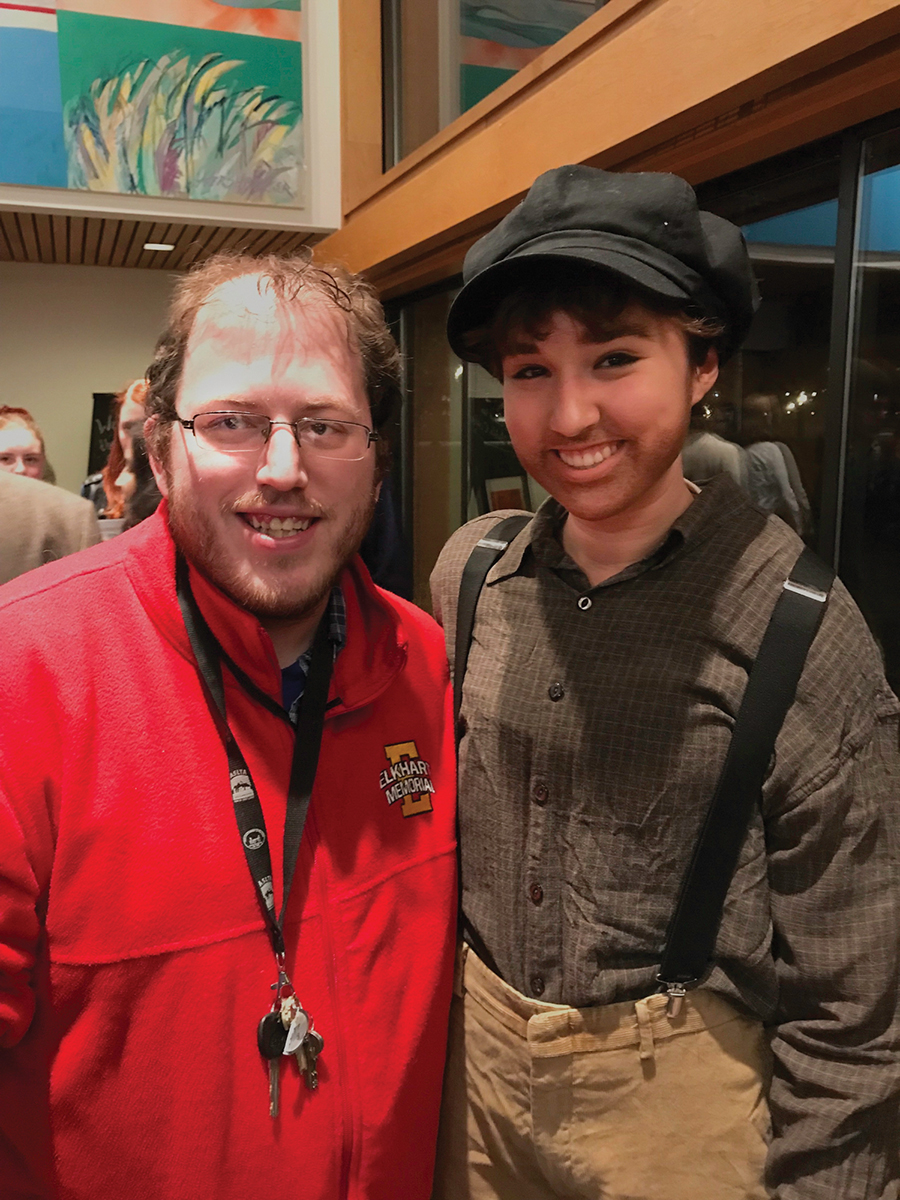Nouri Marrakchi is a cheerful, easy-going teacher at Elkhart Memorial High School with Moroccan roots and a background in professional theater. He also happens to be deaf.
Marrackchi is currently assisting the GC theater program in its portrayal of a deaf character for the show “Mother Hicks.”He grew up in Denver in an all-hearing family.
“I’m lucky. Not everyone has parents that learn how to sign,” he said. “There’s a program to teach parents of deaf children, so that’s how they learned.”
Even though Marrackchi signs fluently, he doesn’t necessarily have to rely on ASL to communicate.
“I can lip read most things. Most hearing people talk so fast. Remember: I’m deaf, I’m trying to read your lips–Calm down!” he said, laughing.
For some in the deaf community, it can feel uncomfortable to speak out loud without knowing how it sounds to everyone else or how they might react, but Marrackchi’s experience has been a bit different.
“I grew up talking,” he said. “To be honest, I don’t have a ton of experience with [obnoxious hearing people.] But if something happens, I just ignore them, and it’s not an issue. I’ve never really had a bad experience.”
He also had quite a bit of practice growing up.
“My dad encouraged me to help out at his restaurant, communicating with the customers, just talking to them. I also did speech therapy for 12 years, so I really try to practice that,” Marrackchi said. “I really understand the benefits of speech therapy–not all people do. But we live in a hearing world; it’s important to be able to communicate.”
Marrackchi describes himself as tri-cultural.
“My dad is from Morocco. So, my mom’s culture [United States], my dad’s culture and deaf culture–it’s all a hodgepodge,” he said.
Growing up, Marrackchi’s family would often eat food from his father’s restaurant, which serves Moroccan food. As he talked about it, he threw his head back, rubbed his belly and sighed, as if in appreciation of the memory.
Marrackchi still has family in Morocco, most of whom know ASL. He has visited seven times throughout his life, but said he is looking forward to going again. This time, there will something new to enjoy because his uncle is building a beach house.
Marrackchi studied at the University of Northern Colorado to pursue a bachelor’s degree in special education. After graduating, he went to McDaniel’s College in Westminster, Maryland for graduate school in deaf education. He left, however, after only one semester.
After leaving Maryland, he followed his roots back to Colorado. Thinking he’d be a good addition to the Rocky Mountain Deaf Theater, a director friend of Marrackchi asked him to join the troupe in 2013. Marrackchi agreed, and he began his theatrical career shortly thereafter, working in both acting and tech areas.
He was mainly involved with two shows: “One Flew Over the Cuckoo’s Nest” and “Murder at the Howard Johnson’s,” which played across the state of Colorado.
“I played two main characters, which was a really fun experience. This theater used both hearing and deaf actors, and the audience included both as well,” Marrackchi said. “I had a voice interpreter for one. But in the other show, we only signed. It was really interesting.”
He hasn’t been involved in theatre since that time, and he said he really misses it.
“I got really immersed, and I really loved it,” he added. “But theater is a lot of work, and just so time-consuming.”
Eventually, Marrackchi moved to Peru, Indiana, where he would teach high school ASL for two years.
“I enjoyed teaching and being with people there, but there are not very many deaf [people], so it was sometimes hard,” he said.
It was this feeling of isolation that led Marrackchi to move to Elkhart three years ago.
“There are just more resources here; the deaf community is bigger. I knew I could be more involved,” he said.
Marrackchi currently teaches ASL to around 165 hearing students at Elkhart Memorial High School. He teaches a range of classes, including the most basic levels. His eyes lit up and his hands moved enthusiastically as he talked about his job.
“I tend to use an interpreter for the first three days of class to explain the rules, policies, open conversation. Then, we get rid of the interpreter, and we learn visually. I use PowerPoints, slides, and show videos. After three weeks, we can get along without talking. Sometimes they still use their voices in class though, and that’s not cool,” he said. “But I try to be patient. I’m lucky enough to be in an area where people are very respectful of deaf culture and deaf people.”



